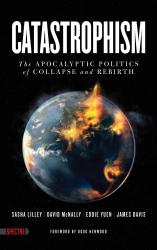by Sasha Ross

Charlton Heston, an Ubermensch mix of lefty liberationist and right-wing macho-apocalyptarian, heralds the collapse and the end of ideology in the 1971 film “Omega Man”
The Apocalyptic Politics of Collapse and Rebirth

Check out the book at PM Press here.
A collection of essays by leading radical commentators Sasha Lilley, David McNally, Eddie Yuen, and James Davis, Catastrophism (PM Press 2012) is nothing less than a problematization of the ends of ideology. Throwing into critical light the deployment of right, left, and ecological ideologies, Catastrophism challenges the usage and efficacy of political narratives. Here we have analyses of the left wing critique of political economy (Lilley), the right wing critique of social degeneration (Davis), and the ecological heralding of the “great collapse” (Yuen).
The position is elucidated clearly in Lilley’s introduction: “The foundational problematic of this book is the question of politicization: what narrative strategies are most likely to generate effective and radical social movements.” The analysis is thus immediately presented as a point of ideology, utilizing the important signifier, “problematic”, which was developed by Luis Althusser, the critical thinker of 20th Century ideology. For Althusser, a problematic is an ideological “tipping point” of sorts, a truth statement that is positioned in such a way as to unlock a space of thought. The thing to analyze in the problematic of Catastrophism is its symptomal reading of ideology, itself: What are the purposes, the ends, of ideology, and how are those purposes actualized in the eschatology of the narrative?
While it is tempting to claim that any intimation of “end times” will simply fall flat, leading us to practical action as a movement, that is not the point of the book. Instead, Catastrophism finds that certain right wing positions on apocalypse do work, while the left’s own arguments often dissolve into inutility, even mendacity. Such a delineation was illustrated by the actions of French president, Hollande, who pled before the World Future Energy Summit for increased investment in renewable energy “to avoid catastrophe” even as his armies consolidated power in Mali. The contradictions come into brutal focus when one recognizes that Mali is a paradigmatic site of the most brutal sort of land grabs, where European companies in particular have swatted aside the needs of small, subsistence farming communities predominantly in the interest of growing monocrop biofuels. Soon after the invasion, major newspapers around the world already proclaimed that Hollande had finally grasped support from France’s jingoist right wing. Here, we find “catastrophe” lurking in the index of empire.
As much was affirmed, however, in 1995 by Hungarian philosopher István Mészáros in his seminal work Beyond Capital: “no socialist can seriously entertain the idea that the capital system can be historically superseded so long as the ascendancy of the bourgeois order can assert itself on the global terrain. This means that the much needed reassessment of all socialist strategies, in different parts of our planet, must take on board the disturbing and negative dimension of this ascendancy, both in interpreting the historical past and in the assessment of the future. For a failure to give due weight to the forces that sustain the capital system as a whole leads either to the naïve expectations of ‘catastrophism’ or to defeatist disenchantment and the total abandonment of the socialist perspective, as witnessed in recent past.” In other words, the abandonment of the left occurs through one of two avenues, both of which arising from defeatism: either give up and wait for the collapse as victory, or admit doom and embrace the dismal science of neoliberalism. This form of negative thinking is conducive to the right wing, and was even celebrated in an article published by The Wall Street Journal called “The Power of Negative Thinking”.
Fail Better!
The nuances between attitude and reality make the most important essay in the collection the first: Eddie Yuen’s “The Politics of Failure Have Failed” concerning the movement of radical ecology. Yuen approaches the ecology movement as a movement combining right and left elements, a trans-boundary borderland epistemology, to use one of Walter Mignolo’s turns of phrase, that shifts and moves to its own drumbeat. For Yuen, ecology is intimately connected to leftist struggles against capitalism, so “The Politics of Failure Have Failed” favors that aspect of the ideological apparatus. Explains the author: “The chaotic world system that capitalism has brought into being ensures that no individual capital or state has the power or responsibility to counteract the tendencies toward ecological degredation.” The truth of this statement ought to be underlined by the problematization of politics expressed earlier, seeming to indicate that radical ecology is paralyzed without leftist struggles in the forefront.
According to Yuen, ecology in itself tends toward alienated attempts to develop isolationist utopias that are based in privilege and ignorance of broad social struggles. The analysis turns into an attack on right wing primitivism or survivalist tendencies, which seek out and prepare for the collapse of industrial civilization. Translating the old adage that ‘anti-semitism is the socialism of idiots’, Yuen asks, “[is] the advocacy of civilizational collapse the environmentalism of idiots?”

This critique is not new to Earth First!. In the early 1990s, the Earth First! group that defended redwoods in Northern California called itself “Ecotopia EF!”. EF!ers like Karen Pickett and Daryl Cherney represented the group as it defended the legacy of Judi Bari and fought for tactics of nonviolent civil disobedience. As elements of EF! grew increasingly cynical, and promoted direct action in the form of mass monkeywrenching, tree spiking, and even arson, Ecotopia EF! dissolved, but not before sending numerous “Dear Shit fer Brains” letters to the editors of the Journal.
But the tactical debates do not present a direct symmetrical debate over the problematic of catastrophe. Often, both sides fall toward the side of a kind of post-collapse utopianism, a kind of dystopian post-collapse scenario, wherein tribal bands of post-human scavengers prey upon the weak and unprepared as small outposts of post-civilized ecowarriors maintain a degree of agrarian collectivity through permacultural harmony with nature.
What’s not to love about such utopian dreams? Aren’t they already latent in pop culture icons like “Mad Max” and the “Hunger Games”? That’s a serious question, because I never took Panagioti’s advise to go see “Hunger Games” and I saw “Mad Max” when I was, like, 12.

It is on this note that Sasha Lilley’s essay launches into the critique of leftism that turns inward from Yuan’s position on radical ecology. Harkening back to the Second International, Lilley opens the discourse summed up by the confident words of Karl Kautsky: “Irresistable economic forces lead with the certainty of doom to the shipwreck of capitalist production.” Here we have the catastrophism of the left, assuring the audience that the collapse of capitalism will herald a new dawn for social revolution. Here we have Kautsky leading the Second International into the semi-infected disgrace, while Lilley maintains the enthusiasm for social change upheld by the band of Leftist communards.
Hence, in the opinion of Catastrophism, the fundamental principle of “collapse” is not wrong, per se, but it is a problematic if it does not respect and appreciate mass movements. Rather than isolated, alienated attempts to undermine industrial civilization to the detriment of virtually all of its inhabitants, the book drives at the integration of large social movements toward widespread solidarity.
Lilley’s exquisite prose dissects the paradigms of the left, and locates the false consciousness behind the failure of catastrophism. Instead of capitalism being doomed, it appears we find ourselves still awaiting politics, our own Robert Neville, unless we engage in collective self-management. Lilley quotes Anton Pannekoek (as good a stand-in for Chuck Heston as anybody), who explains that “the self-emancipation of the proletariat is the collapse of capitalism.” In other words, the collapse of capitalism, as liberation, is not undesirable, per se, but it can only occur, as McNally will later explain, “simultaneously [with] the overthrowing of the oppressors and the self-transformation (the de-zombifying) of the oppressed themselves.”
A Conclusion in Three Paragraphs

The problematic appears to take on a Borromean knot formation when the catastrophist discourses of the former two sustain and strengthen that of the latter, and visa versa: were it not for the declarations of catastrophe from the left and ecology movement, the right’s own catastrophe narrative—that of the decline of morals and civilization, itself—would not exist in the same way. Yet, if they all unraveled, would the ideologies themselves would disintegrate on some level? The question here remains one of adversarial engagement: can peace and overarching community be formed amongst all of humanity through generally productive methods of communication and logistical planning?
We may look not to Hurricane Sandy to define the course of our understanding of Catastrophism, but to the relief effort afterwards—to the incredible efforts of freely associating workers forging paths of community and bonds of mutual aid—to find out how the discourse can shift to action in the era of “the end times”.

